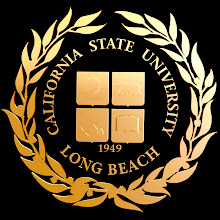For a guy who almost quit college a couple of times and changed his major from engineering to business, Tim Appelbaum seems now on track.
Recently, the California State University, Long Beach (CSULB) senior had another verification that his decision to stay in school was a good move when he finished as the fourth best orator in the country out of 128 competitors at the recent national moot court competition in Miami. Approximately 500 individuals began in regional competition across the country.
“I was shocked,” said Appelbaum. “The competition there is very heavy. When I wasn’t called after the 20th or 19th places, I didn’t think it was in the realm of possibility. There were a lot of people contributing to this and it was really a team effort.”
Orators are judged in four categories -- knowledge of subject matter, response to questioning, forensics, and respect for the courts -- with each category being worth 100 points. Appelbaum received 385.5 points out of the possible 400.
“I think he was genuinely surprised,” said Lewis Ringel, who has served as the moot court team coach for the past four years and has been involved through the program’s entire eight years of existence. “After they called his name there was this long pause.”
Appelbaum’s involvement in the moot court program came about after he took a Political Science 100 class with Ringel.
“He just mentioned something about it and for some reason I decided to give it a shot,” said Appelbaum. “I didn’t feel at home when I first joined the class because there were President’s Scholars there, people with 4.0 GPAs and people graduating in thee-and-a-half years. I felt really out of place, but I’ve been in it the past two years and we have awesome, great people. At Long Beach State, this program ranks right up there with my fraternity as my best experiences and people I will have as lifelong friends out of the program as well.
Ringel credit’s Appelbaum success to a lot of hard work as well as natural talent. In his two years, he has participated in five tournaments, winning one, reaching the semi-final rounds of two, and advancing to the elimination round in each.
“He’s at the very top of all the students we have had in our program. He's certainly in the top five,” said Ringel. “He uses questions to advance his arguments and he layers his answers so that he ends with something that invites further questions. He ends with something almost provocative. Judges pick up on that and they ask him about that so he is completely controlling the direction of the argument. He invites follow-up questions that he is prepared for. It’s not common because you just can’t teach it. I have probably told every student to do that 50 times and some of them do, but Tim consistently does it.”
Appelbaum also doesn’t use notes during his presentations, something that only the top orators tend to do, according to Ringel. He also credits his ease of speaking in public in large part because he has played and sung in a band.
“After playing in a band doing stupid stuff up on stage, you kind of stop caring what people think about you,” said Appelbaum “That really helped out in the competition.”
“Presentation is a big part of this, and we work a lot on it,” said Ringel. “Forensics deals with things like eye contact and being conversational. He doesn’t use any notes, which is not unusual for the best orators. It is unusual when you consider that nationally about 450-500 students compete and my guess is that it’s really the select ones who don’t use notes. It’s certainly more impressive to the judges.”
Appelbaum credits his high finish, in part, to his individual style of presenting his argument, which he think the judges like.
“My strength isn’t with a large vocabulary or anything like that,” said Appelbaum, “but a down-to-earth fashion that the judges are able to understand better than if they had a bunch of fancy words thrown at them. I think people appreciate that.”
As for what Appelbaum plans to do upon graduation next year.
“Before this program, I couldn’t write a sentence basically and now I am able to read critically and write,” he said. “After I did the moot court last year, I decided I wanted to go to law school. I’ll probably do corporate litigation or something in the entertainment industry.”
-- Shayne Schroeder
Subscribe to:
Post Comments (Atom)




No comments:
Post a Comment